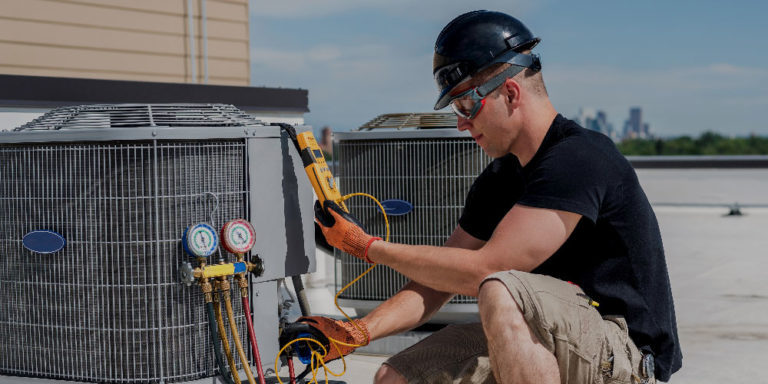— 5 min read
Insurance for HVAC Contractors: What It Covers and Why You Need It

Last Updated Aug 14, 2024

Thomas Tracy
Financial & Insurance Advisor
13 articles
Thom is a group benefits consultant with over 25 years of experience as an insurance and financial advisor. He has written for Quickbooks, tED Magazine, Investopedia, the National Bank of Arizona, and others.
Last Updated Aug 14, 2024

Heating, ventilation, and air conditioning (HVAC) contractors must protect their property while reducing the odds that a job-related accident or injury could financially harm their business. Damaged or stolen tools and equipment can erase a considerable investment, and bearing responsibility for damage to another person’s property can mean significant costs. HVAC contractor insurance is one way to help protect your financial interest if things go wrong on the job.
An HVAC business policy covers many common hazards and perils you might face during the course of construction. This contractor's insurance solution is typically the most cost-effective means to secure coverage and give you peace of mind.
Table of contents
What is HVAC contractor insurance?
HVAC contractor insurance is a business insurance package commonly offered by all carriers that issue contractor policies. The policy will help indemnify your business or another party if either of you suffers some financial loss due to a work-related accident, theft, illness, etc.
The policy includes two main components that help protect the financial standing of the business: Business property insurance and general liability insurance.
Business property insurance covers the value of materials you own to perform your job. Liability insurance will help cover expenses for damage to someone else's property and/or legal costs if another party decides to file a lawsuit.
Unique situations could arise for HVAC contractors when installing heating units in residential or commercial buildings. A faulty connection in a heating unit could lead to a fire that results in minor or major property damage. In either case, your HVAC insurance policy can help cover the cost of replacement or repair for the owner of the project if you or an employee is found to have some fault in the cause of the accident.
Who needs HVAC contractor insurance?
If you work on a job with a general contractor, the contract itself may require that all specialty contractors have insurance before the job can begin. This requirement helps assure project owners that all parties have proper coverages in place. The contract may ask that each specialty contractor carry a liability amount of $2 million, for example. Often, this amount will exceed the total cost of the project for the owner’s optimal protection.
As you can see from the liability amount that could be contractually required, a catastrophic loss can severely harm an HVAC business if insurance is not in place. If you were found responsible for the cause of significant property damage or personal injury during your business operations, legal expenses and possible jury awards could drain much, or all, of your business assets.
Insurance policies for HVAC contractors
You can tailor an HVAC business insurance program to meet your needs. Policies cover a number of other situations beyond basic liability and business property coverage.
- Commercial auto insurance: A business auto policy covers the value of your vehicles or provides you coverage in case of damage to another party’s property. It also helps cover costs associated with a passenger or pedestrian injury.
- Equipment floater insurance: You may own unique tools and equipment, the value of which exceeds the coverage amount provided in a base policy. This policy or policy endorsement helps get you that extra coverage.
- Inland marine insurance: When traveling from project to project, inland marine insurance covers tools and equipment wherever you go.
- Professional liability insurance: A professional liability policy or errors and omissions insurance can help protect your HVAC business if it were held responsible for an oversight or design flaw that caused financial harm to another party.
- Installation floater: This policy or amendment covers building materials wherever they’re located. The coverage applies to roofing shingles, for instance, destined to become part of a permanent structure.
- Workers' compensation insurance: If you have HVAC employees, this insurance helps cover lost income and/or medical expenses if one of your workers becomes sick or injured on the job.
How do contractors purchase HVAC insurance?
To get an HVAC contractors' policy, it's important to meet with a local licensed insurance professional. The insruance company may ask for specific information, including: contact info and an employer identification number (EIN), and they may require payroll and sales information. Policy rates may be calculated using some of this information. If you currently have HVAC insurance, the carrier may also ask for claims history related to your account.
If your needs go beyond what a core policy provides, the insurer may ask for additional information such as a stated value of tools and equipment, a financial statement, and credit history. After the carrier evaluates your business situation, the policy gets issued.
How much does HVAC insurance cost?
The cost of HVAC insurance depends on a few variables, including:
- The nature of your business and the probability of claims occurrences (an HVAC contractor generally bears less risk than a roofing business, for example)
- The number of your annual sales or the size of your payroll
- The overall or scheduled value of tools and equipment you decide to insure
- The location or radius of operations within which you do business
- The number of claims you may have incurred in previous policy years
It's important to consult with a licensed insurance professional in your area to determine how much insurance policies may cost for your specific needs. The more information you can provide to an insurance representative about the day to day of your business, the better. This can help them put together a portfolio that addresses exposures in efforts to further mitigate risks that can affect your bottom line.
Was this article helpful?
Thank you for your submission.
0%
100%
You voted that this article was . Was this a mistake? If so, change your vote
Scroll less, learn more about construction.
Subscribe to The Blueprint, Procore’s construction newsletter, to get content from industry experts delivered straight to your inbox.
By clicking this button, you agree to our Privacy Notice and Terms of Service.
Thank you!
You’re signed up to receive The Blueprint newsletter from Procore. You can unsubscribe at any time.
Categories:
Written by

Thomas Tracy
Financial & Insurance Advisor
13 articles
Thom is a group benefits consultant with over 25 years of experience as an insurance and financial advisor. He has written for Quickbooks, tED Magazine, Investopedia, the National Bank of Arizona, and others.
View profileExplore more helpful resources

What is Equipment Floater Insurance for Contractors?
Most contractors rely on tools and equipment to complete construction projects. But if something happens to those items, they can be expensive to replace. Contractors can benefit from purchasing an...

Construction Equipment Rental Insurance: How & Where to Get Coverage
Contractors and construction businesses that rent equipment should consider getting construction equipment rental insurance. This type of insurance covers the cost of replacing rented tools and equipment if they get...

Understanding Construction Insurance: Actuarial vs. Underwriting Factors
Determining the price of construction insurance is complex, with much of the work happening behind the scenes. Most construction companies interact primarily with an insurance broker or agent, but actuaries...

Construction Insurance Pricing: What Determines the Cost of Insurance?
Construction is a risky and litigious business, and insurance can help mitigate the risks for builders and owners. Construction insurance is a valuable and frequently required tool, so understanding how...
Free Tools
Calculators
Use our calculators to estimate the cost of construction materials for your next project.
Templates
Find a template to help you with your construction project tasks.
Material Price Tracker
Get the latest U.S. retail prices and view historical trends for common building materials.
Glossary
Explore key terms and phrases used in the industry.
